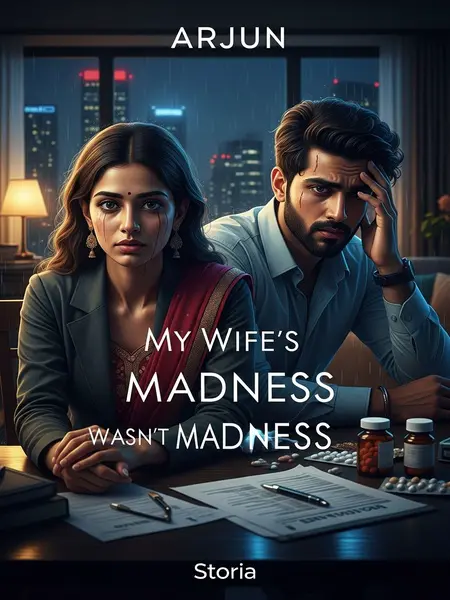Chapter 2: The Breaking Point
They visited several hospitals, including specialised psychiatric hospitals, and all agreed that she had schizophrenia, prescribing similar medication.
They went from Ruby Hall to KEM, sitting in endless queues, clutching files thicker than a wedding album. Each new doctor peered over her old files, nodded sagely, and changed only the brand name of the medicines.
When the doctor said the disease was incurable, Arjun felt an indescribable sorrow.
He broke down in the car park, his shoulders shaking, while his mother placed a shaky hand on his back. “Beta, sab theek ho jayega,” she whispered, but he knew she didn’t really believe it herself.
After so many years as a couple, such a sudden change left him completely at a loss.
He thought of their anniversaries, family holidays to Mahabaleshwar, evenings spent sharing ice cream on the terrace. How had it come to this? “Itni saal ki shaadi... ab yeh sab?”
Still, he mentally prepared himself to go through thick and thin with his wife. If all else failed, they would go to Mumbai, find a bigger hospital, and spend whatever it took.
He started calling relatives in Mumbai, asking about good hospitals—Lilavati, Hinduja, NIMHANS in Bangalore if needed. “Paise ki fikr mat karo,” he told his brother. “We’ll do whatever is needed.”
But the night before they planned to leave for Mumbai, Mrs. Meera's condition suddenly worsened.
As the power flickered off and on—load-shedding again—Meera began to cry uncontrollably. She started laughing in between, then muttering to herself. The family tried to calm her, but she only grew more agitated.
She was crying and laughing at home, talking nonsense, and even showed signs of self-harm.
At one point, she tried to scratch her arms, shouting at invisible enemies. The daughter screamed, Arjun rushed forward, grabbing her hands. The mother-in-law began reciting Hanuman Chalisa, her voice trembling with each line.
This terrified Arjun.
His hands trembled as he dialed 108 for an ambulance, voice cracking, “Please come fast, my wife... she’s not well!”
He immediately called the ambulance and rushed her to the emergency room.
He barely remembered locking the door behind them. The ambulance’s siren cut through the night, neighbours peeping from balconies, someone whispering, “Uparwale ka bhala kare.”
That was the first time I met this patient.
I was midway through my night shift, sipping watery hospital chai, when the stretcher rolled in. The nurse whispered, “Sir, new psychiatric emergency—family looking very disturbed.”
My first impression—her eyes were vacant, her hair tangled, her spirit somewhere far away.
Her hair was a mess, her expression blank, her eyes dull.
A strand of hair clung to her forehead, damp with sweat. Her gaze met mine for a moment—empty, distant, as if she was looking through me.
You see all kinds of patients in the emergency room, but this was my first time encountering someone with schizophrenia.
We get trauma, heart attacks, asthma, but such a severe psychiatric case—this was something new for me. I reminded myself, “Keep calm, doctor. Patient needs you.”
At the time, I didn't have much experience dealing with this kind of illness, and I was inwardly groaning.
“Arrey, what luck,” I thought, “Why now, of all nights?” But of course, a doctor’s job is never done, and the night shift brings its own surprises.
To admit such a patient in the middle of the night—what a headache!
My mind ran through the standard procedures, while part of me worried about the paperwork, the logistics, the tired nurses. But seeing the family’s faces, I knew complaining was pointless.
But when I saw Arjun's bloodshot eyes, all my complaints faded away.
He looked utterly exhausted, face drawn, stubble grown, eyes pleading for help. I felt a surge of sympathy—a fellow human being, broken by circumstances.
I knew the most miserable person was not me, but the haggard, weathered husband in front of me.
A doctor can walk away after duty, but a husband carries this burden home. I silently resolved to do my best for them.
He had already endured everything that had happened, and he told me all about it.
He poured out the story—halting, anxious, voice shaking. I listened carefully, asking questions, making notes, reassuring him as best as I could.
I called several nurses over, and together we brought the patient into the resuscitation room, hooked her up to cardiac monitoring, put on a blood pressure cuff, measured her blood pressure—
The sharp smell of Dettol filled the air, a nurse’s payal tinkling as she moved around, the distant cry of a newborn from the maternity ward mixing with the monitor’s beeping.
After all these procedures, the patient was surprisingly docile and quiet, not making a fuss, which I hadn't expected.
I was half-expecting shouting or resistance, but Meera lay still, staring at the ceiling fan. The staff exchanged glances, a little relieved but wary.
I had thought she would turn the emergency department upside down, and had already asked the nurses to prepare sedatives like diazepam and haloperidol, ready to administer them intravenously if needed for rapid sedation.
The medicine trolley was ready, Sister Fatima hovering nearby, needle already loaded. But there was no need. For now, at least.
Arjun said her condition had suddenly worsened that night and she was very manic at home, but calmed down after arriving at the hospital.
He described how, at home, she had thrashed about, screamed, but the moment she saw the hospital’s white lights, she grew eerily calm. He whispered, “It’s as if she knows she’s safe here.”
After reading the medical records, hearing about all the previous symptoms, and seeing the brain imaging her family brought, the diagnosis of schizophrenia seemed solid.
The stack of reports—MRI, blood work, psychiatric notes—all pointed to the same thing. But my mind was restless. Sometimes, I’ve learnt, you have to question even the obvious.
But I was still a bit uneasy. I couldn't put my finger on it, but I just felt her condition might not be so simple.
Something in her silence, the way she clutched her left arm, or the unnatural stillness—it kept nagging at me. My gut wouldn’t let me rest—sometimes, it’s not just the textbooks, it’s the feeling in your bones.
Of course, even just schizophrenia was enough of a headache, but I felt she might be even more complicated—maybe it was intuition.
Somewhere in my bones, I sensed, “This story is not so straightforward.”
Or maybe not intuition, but vigilance.
Years of seeing the unexpected had made me cautious. Better to be safe than sorry—no room for complacency in the emergency department.
If an emergency doctor doesn't have a bit of instinctive caution, they'd have been in trouble many times by now.
In medical college, we’re taught—never assume. Always check, double-check, and then check again. That habit had saved me more than once.
Schizophrenia itself isn't fatal, but if it's schizophrenia caused by other organ problems, it could become life-threatening at any moment.
There are medical causes that can look just like madness, but are much more dangerous. I remembered lectures about metabolic encephalopathies, conditions that could kill if missed.
For example, hepatic encephalopathy, uremic encephalopathy, and so on.
Liver, kidney, lungs—any major organ failing can cause the mind to unravel. “Never forget the basics,” my senior had drilled into me.
I explained these concerns to Arjun.
He listened, nodding earnestly, eyes wide with hope and fear. “Doctor, please—do whatever is needed.”
In any case, the first step was to get her into the resuscitation room and hooked up to cardiac monitoring.
Sister Fatima adjusted the BP cuff, another nurse cleaned the IV port. I checked the oxygen saturation—98%. Good.
Then I asked the resident to call a neurologist for a consult. We should have called a psychiatrist, but there were none on duty at night, so neurology was the closest option—getting another opinion never hurts.
The resident, a fresh-faced MBBS from Solapur, nodded and quickly dialed neurology. In the meantime, I started drawing up a plan.
Her blood pressure came back: 210/100 mmHg!
The nurse called out, “Sir, BP is very high!” My heart skipped a beat. This was more than stress.
Arre deva, BP itna high? Please, no brain bleeding, I prayed.











